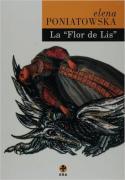Appreciation of Elena Poniatowska’s La Flor de Lis by Sandra Cisneros
The little hand serving me coffee is also the hand that wrote the exquisite novel La Flor de Lis (1988). It seems absurd a writer of such worth should bother serving coffee to anyone, but it’s precisely this humility, this willingness to serve others, whether it be coffee, or novels, or testimonies, or tamales, that makes Elena Poniatowska a writer as well loved by cab drivers as by professors. The title alludes to France, but if you’re hip to Mexico City, you’ll know La Flor de Lis is also the famous tamale restaurant in la colonia Condesa.
 La Flor de Lis is a love story about mother and motherland, about love of México lindo y querido (pretty and best), a culture where mothers are revered as goddesses, and a goddess, la Virgen de Guadalupe, is revered because she is “the” mother.
La Flor de Lis is a love story about mother and motherland, about love of México lindo y querido (pretty and best), a culture where mothers are revered as goddesses, and a goddess, la Virgen de Guadalupe, is revered because she is “the” mother.
It’s a fairy tale told in reverse. Daughters of royalty flee France under siege from World War Il, and in the course of their childhood and adolescence in Mexico, we witness the discovery of what it means to belong to a culture, what it means to fall in love, and what, after all, it means to be a woman, because the story is steeped in the body of a woman, in the body of that country.
Nowhere else have I read anyone describe the joy of scrubbing a courtyard with a bucket of suds and a broom. But it’s el zócalo, the central plaza of Mexico City that the narrator wants to scrub out of puro amor. And that ultimately sums up how a writer like Elenita became Elena Poniatowska. What we do for love, after all, is the greatest work we can do.
Sandra Cisneros’s Top Ten List
1. The Time of the Doves by Mercè Rodoreda (1962)
2. The Ten Thousand Things by Maria Dermout (1955)
3. Stones for Ibarra by Harriet Doerr (1984)
4. The Burning Plain and Other Stories by Juan Rulfo (1953)
5. Good Morning, Midnight by Jean Rhys (1939)
6. La Flor de Lis by Elena Poniatowska (1988)
7. Borderlands/La Frontera by Gloria Anzaldúa (1999)
8. The Book of Embraces by Eduardo Galeano (1989)
9. Dreamtigers by Jorge Luis Borges (1964)
10. Maud Martha by Gwendolyn Brooks (1953)
Sandra Cisneros (born 1954) is an American writer known for experimenting with literary forms in works that explore cultural hybridity and economic inequality. She is a pivotal figure in the rise of Chicana literature. Her works include the novels The House on Mango Street (1984), Carmelo, or Puro cuento (2002), Have You Seen Marie? (2012) and Marita, I Remember You (2021); a story collection, Woman Hollering Creek and Other Stories (1991); three collections of poems, Bad Boys (1980), My Wicked Wicked Ways (1987) and Loose Woman: Poems; a children’s book, Hairs/Pelitos (1994) and a collection of autobiographical stories, A House of My Own: Stories from My Life (2015). She is the founder of two foundations that serve writers and is the organizer of the Latino MacArthur Fellows (Los MacArturos). She has been honored with numerous awards including the MacArthur Fellowship, two National Endowment for the Arts Fellowships, and a Texas Medal of the Arts. To learn more, visit Sandra's official website.